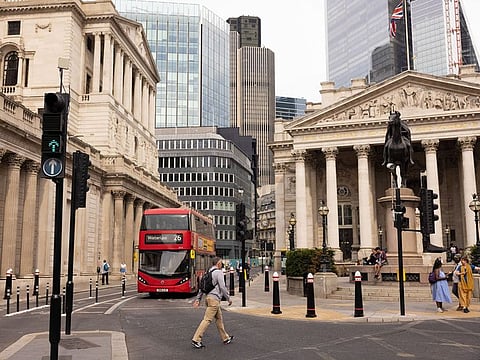Bank of England set to tip UK into recession by year-end, say economists
Starting in the 4th quarter, the recession will cost over 1 per cent of economic output

The Bank of England will push the UK into recession by the end of the year in its battle to curb the worst inflation of any Group of Seven economy.
That’s the warning from Bloomberg Economics, which says a shallow if protracted downturn is the price of taming an inflation rate that remains stubbornly close to double digits “- despite 13 straight interest-rate increases since the end of 2021.
Economists Dan Hanson and Ana Andrade now expect a yearlong recession starting in the fourth quarter to cost just over 1 per cent of economic output. That assumes the BOE raises rates to 5.75 per cent by November from the current 5 per cent. However, money markets are almost fully pricing in 6.25 per cent by December, raising the possibility of a far worse slump.
“The risk is the data continue to prove unresponsive to the BOE’s actions and interest rates rise further than our baseline,” Hanson and Andrade wrote. “As borrowing costs move above 5 per cent, we think the risk of a financial stability shock increases exponentially.”
The analysis means Prime Minister Rishi Sunak could be fighting the next election against a backdrop of shrinking output, rising unemployment and mounting home repossessions as mortgages costs continue to climb. The average 2-year home loan is now around 6.25 per cent, approaching the levels seen during the market turmoil that brought down his predecessor, Liz Truss, last autumn.
While Sunak doesn’t have to call an until January 2025, he is widely expected to go to the polls next year. Surveys show his Conservative Party consistently trailing the Labour opposition by more than 10 percentage points.
Causing the economy to shrink would also heap criticism on the BOE, not least from Conservative lawmakers at risk of losing their seats. The BOE now faces the very real possibility of having to reinstate its recession call at its next forecasting round in August, just three months after delivering the biggest upgrade to its projections since gaining independence in 1997.
Hanson and Andrade expect the economy to grow just 0.1 per cent this year and shrink 1 per cent in 2024, a sharp revision from the 0.3 per cent growth previously estimated.
Even then, with wage growth refusing to subside and cheaper energy set to boost household incomes, inflation will end this year just above 5 per cent “- more than double the 2 per cent target and down only modestly from the current 8.7 per cent. In an illustration of strength of underlying cost pressures, core inflation “- which hit a 31-year high of 7.1 per cent in May, “- is only likely to move below 6 per cent in early 2024.
“The recent strength of the inflation and wage data has left the BOE with little choice but to squeeze the economy even harder,” Hanson and Andrade write. The BOE will start cutting rates in the second quarter of next year but proceed cautiously, given that inflation will still be above target.
“The big risk to our forecast is that the BOE tightens by more than we have assume,” they said. “In a world where it followed market expectations, which is about 100 bps higher on average over the next three years compared to our forecast, we would expect the economy to be about 1 per cent smaller by 4Q25 with a deeper recession.
“What that estimate could easily miss is the possibility that the lags from past tightening are longer than we have assumed or that high rates create financial instability. Should either of those scenarios play out, the recession would be significantly deeper.”
Sign up for the Daily Briefing
Get the latest news and updates straight to your inbox



